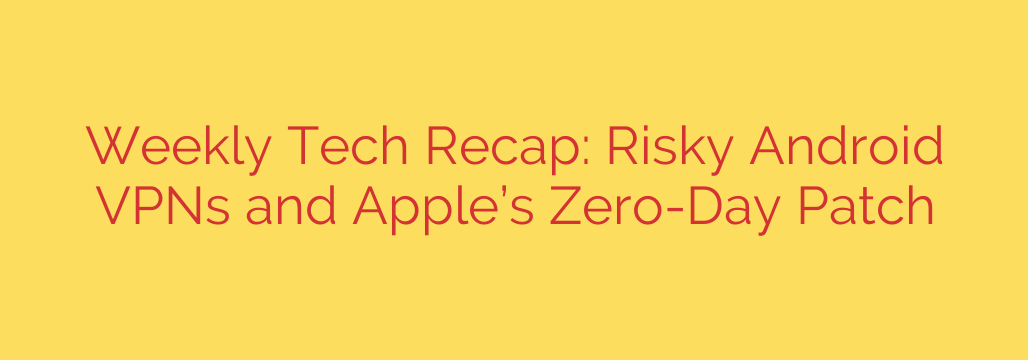
Urgent Security Alert: Update Your Apple Devices and Re-Examine Your Android VPN
In today’s digital landscape, staying vigilant against security threats is not just an option—it’s a necessity. This week, two significant security concerns have emerged that demand your immediate attention, affecting millions of Android and Apple users. From potentially malicious VPN applications on the Google Play Store to a critical zero-day vulnerability in Apple’s ecosystem, understanding these risks is the first step toward protecting your personal data.
The Hidden Dangers of “Free” Android VPNs
Virtual Private Networks (VPNs) are essential tools for enhancing online privacy and security. They encrypt your internet traffic, hiding your activity from internet service providers, advertisers, and potential snoops. However, a recent analysis of several popular Android VPN apps has uncovered some alarming practices that could put your data at risk.
The core issue lies with many “free” VPN services. While the promise of cost-free privacy is tempting, these services often have a hidden price. If you aren’t paying with money, you are likely paying with your data.
Key findings reveal that many of these applications:
- Log and Sell User Data: Contrary to their privacy promises, some free VPNs were found to collect extensive user data, including browsing history and personal information, which is then sold to third-party data brokers.
- Contain Insecure Code: Several apps have been identified with significant security vulnerabilities, including hardcoded secret keys. This means the encryption they promise is fundamentally broken, potentially exposing your online activity to attackers.
- Request Excessive Permissions: Many of these apps demand access to your contacts, location, and other sensitive data that a VPN service has no legitimate need for, turning a supposed security tool into a potential spyware application.
- May Contain Malware: In the worst cases, some free VPNs have been found to bundle adware or even malware, actively compromising the security of your device.
Actionable Security Tips for Choosing a VPN:
- Prioritize Reputable, Paid Services: Established, paid VPN providers have a business model built on subscriptions, not on selling your data. They are far more likely to have robust security and a strict no-logs policy.
- Scrutinize the Privacy Policy: Always read the privacy policy before installing a VPN. Look for a clear and explicit “no-logs” or “zero-logs” policy, which means they do not store any information about your online activities.
- Check App Permissions: Before you hit “install” on the Google Play Store, review the permissions the app requires. If a VPN wants access to your contacts or messages, it’s a major red flag.
- Read Third-Party Audits: The most trustworthy VPNs voluntarily undergo independent security audits to verify their privacy claims. Look for providers who are transparent about these results.
Critical Zero-Day Flaw: Apple Urges Immediate Updates for All Users
On another critical security front, Apple has released emergency software updates to patch a zero-day vulnerability that was actively being exploited by attackers. A “zero-day” flaw is particularly dangerous because it means malicious actors discovered and were using the security hole before developers had a chance to create a fix.
This specific vulnerability could allow an attacker to execute malicious code on a device simply by sending a specially crafted, malicious image. The victim would not even need to interact with the image for their device to be compromised.
This is a serious threat that affects a wide range of Apple products, including:
- iPhones and iPads
- Mac computers
- Apple Watches
The flaw was discovered by researchers at The Citizen Lab, who found it was being used to deliver the notorious Pegasus spyware. This highlights the severity of the vulnerability and the immediate need for action.
How to Protect Your Apple Devices Immediately:
Do not delay this update. The only way to protect yourself from this active threat is to install the latest software patch provided by Apple.
- For iPhone and iPad: Go to Settings > General > Software Update. You should see the update for iOS 16.6.1 or iPadOS 16.6.1. Tap to download and install.
- For Mac: Go to the Apple Menu > System Settings > General > Software Update. Look for macOS Ventura 13.5.2 and install it.
- For Apple Watch: Open the Watch app on your iPhone and go to My Watch > General > Software Update to install watchOS 9.6.2.
Enabling automatic updates is also a highly recommended security practice to ensure you receive critical patches like this as soon as they become available.
Staying safe online requires proactive measures. By being skeptical of free services that handle your sensitive data and by promptly installing security updates from trusted vendors, you can significantly strengthen your defense against the ever-evolving threats in the digital world.
Source: https://www.helpnetsecurity.com/2025/08/24/week-in-review-covertly-connected-and-insecure-android-vpn-apps-apple-fixes-exploited-zero-day/








